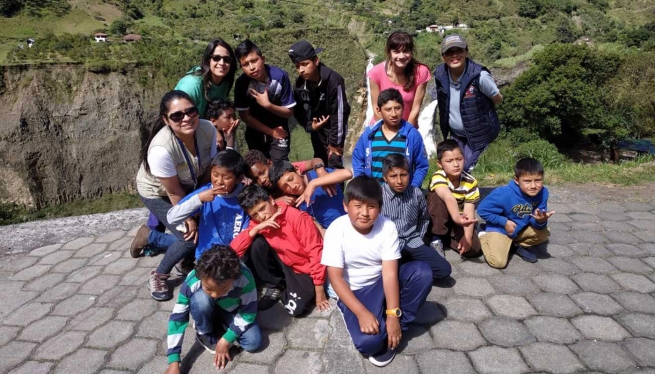ECUADOR: Salesian volunteers from Spain spend time giving back to street children at Don Bosco Farm

(MissionNewswire) Two Salesian volunteers, Pilar Muñoz and Rosa Morago, recently spent time volunteering at the Don Bosco Farm, a Salesian project for street youth that is part of the larger Don Bosco Home located in the city of Ambato, Ecuador. Both Muñoz and Morago are from Spain and received their training for international volunteer work from the Spanish Salesian organization Jovenes y desarrollo (Youth and Development). Their aim was to work with at-risk children and learn the way of life in another country.
“You appreciate their simplicity and the capacity to be happy with very little, with what is necessary. They play with what they have and they do not even complain with a fever. In the end you say to yourself: what a beautiful time I had with the 22 children,” explains Muñoz.
Don Bosco House provides youth with a place to live, nutrition, medical care, education, vocational training and access to psychological care. Morago reflects that the time she spent volunteering taught her to appreciate life. She learned how to enjoy each moment with the person she was with and not to waste time on trivial things that are part of a daily routine. She smiles and is moved when remembering all the love she received and never feeling like a stranger during her time at the Don Bosco Farm.
Muñoz and Morago returned to Spain with the aim of motivating more people to become involved in volunteering. When talking to people about their volunteer experiences they say, “The experience will not disappoint you. Always take something good. Learning about different realities opens your mind and makes you look at life in another way.”
Ecuador’s poverty rate was 36.7 percent in 2007 and dropped to 22.9 percent in 2016. These results show that 1.4 million Ecuadorians escaped poverty within nine years. However, many Ecuadorians still live in impoverished conditions. Ecuador is one of the most inequitable societies in the world, according to UNICEF. The richest 20 percent of the population receives almost 50 percent of the national income while the poorest 20 percent receives only 5 percent.
According to the World Food Program, almost 26 percent of all children under age 5 have stunted growth, increasing to 31 percent in rural areas and 47 percent in indigenous communities.
Close to 20 percent of Ecuador’s population are people of indigenous heritage. For poor, rural and indigenous youth, education provides the best opportunity for finding employment, reducing inequities and breaking the cycle of poverty. Salesian missionaries have been providing education and other social programs for disadvantaged youth across Ecuador for more than 125 years.
###
Sources:
ANS Photo (usage permissions and guidelines must be requested from ANS)
ANS – Ecuador – Pilar y Rosa: “Such beautiful moments with the 22 kids”
UNICEF – Ecuador Poverty




